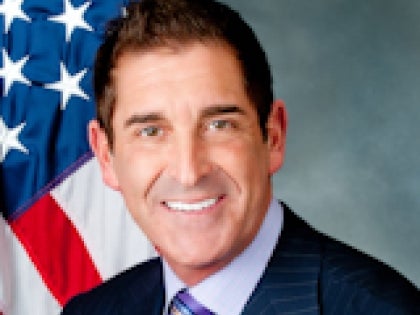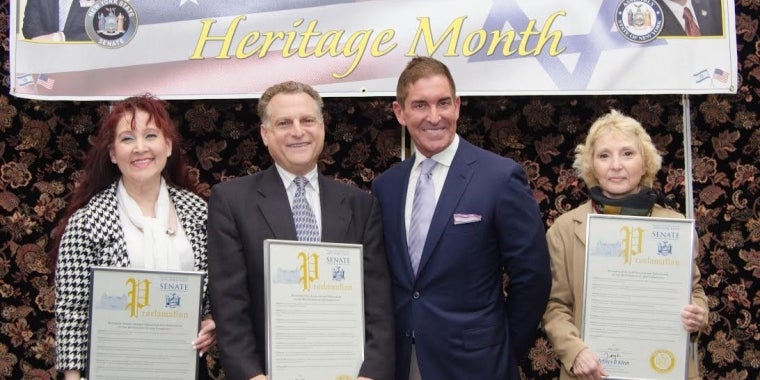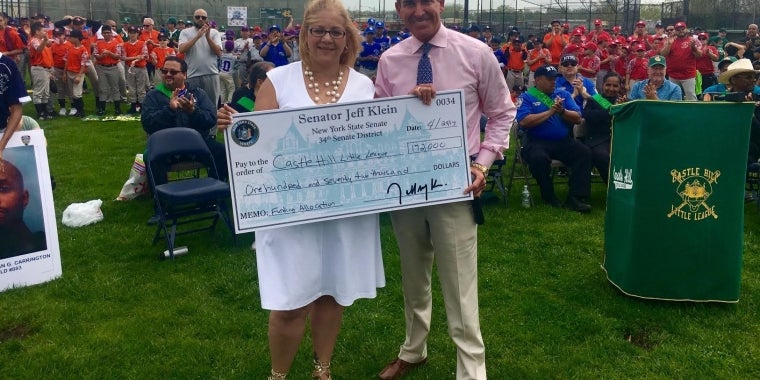
Seniors at Risk
Jeffrey D. Klein
August 4, 2009
Klein investigation finds more than 30,000 estimated incidents of Elder Abuse annually in New York State
Senator Klein, NYC Department for the Aging Commissioner Lilliam Barrios-Paoli and Elder Abuse Prevention Advocates
call for Assembly to pass Klein bill that would streamline reporting and tracking of incidents in an effort to curb abuse
NEW YORK- Senator Jeffrey D. Klein (D-Bronx/Westchester) joined by NYC Department for the Aging Commissioner Lilliam Barrios-Paoli, NYC Human Resources Administration’s Deputy Commissioner for Adult Protective Services Lin Saberski, Jeff Tomlinson, Legislative Coordinator for the NYS Occupational Therapy Association and Joy Solomon, Director of The Harry & Jeanette Weinberg Center for Elder Abuse Prevention At The Hebrew Home at Riverdale released the results of his latest report, Protecting Seniors: Tracking Elder Abuse at the Hebrew Home in Riverdale today.
The report follows an extensive Klein office investigation which found that that there were more than thirty thousand estimated incidents of elder abuse in 2008 in New York State. The report documents the disconnect between various state and local agencies seeking to track the incidence of elder abuse, and proposes legislation that would develop a coordinated approach to more accurately measure this serious and growing problem and help with prevention.
“This report makes clear that our seniors are at risk and need our help. For too long there has been no coherent system for measuring the frequency of elder abuse, my bill would change that and make one agency responsible and accountable for this critical information,” said Senator Klein. “With so many baby boomers nearing retirement, we need to accurately identify the scope of this issue now, so we can develop more effective prevention, protection and treatment.”
Klein’s office surveyed various state and city agencies addressing elder abuse, including the NYS Office of Children and Family Services (OCFS) which contains APS (Adult Protective Services), the Division of Criminal Justice Services (DCJS), the Office of the Attorney General (NYSOAG), the Office for the Prevention of Domestic Violence, the NYS Department of Health, and the Office of the Aging. Data received from the different entities revealed there was no uniformity in defining the different types of elder abuse, the age at which a person becomes a senior, or how specifics are tracked about individual cases. Furthermore, there is no system in place that would bring together the various data collected by different agencies addressing elder abuse. Thus, a comprehensive statewide picture as to how frequent elder abuse occurs is difficult to approximate.
Klein’s report does reveal that there were 19,301 reports alleging elder abuse to Adult Protective Services, in 2008, with nearly 5,000 allegations coming from New York City alone (these reports from NYC include multiple allegations of abuse that may be reported by one individual and does not represent individual cases). While APS does not track substantiated cases of abuse, Klein’s office applied national rates of substantiation (35.1%) and underreporting to project that there may be as many as 34,000 cases of elder abuse in New York in 2008. These calculations relied solely on APS data to avoid counting duplicate cases. DCJS separately reported nearly 7,000 Domestic Incident Reports involving seniors and the Office of the Attorney General received 1,028 complaints regarding patient abuse and neglect, the disproportionate numbers of whom are assumed to be seniors.
“I want to thank Senator Klein for his ongoing dedication to older New Yorkers and his commitment to the serious issue of elder abuse,” said Commissioner Barrios-Paoli. “Senator Klein’s legislation builds upon the City of New York’s efforts to address this often hidden and insidious problem. It codifies the necessary steps we need to take to collect information and data that will further inform and enrich efforts of agencies like the Department for the Aging to assist seniors in need.”
“Senator Klein’s bill will be a great benefit to the City’s Adult Protective Services program,” said Human Resources Administration Commissioner Doar. “With our partners in the Department For The Aging, the NYPD and the District Attorneys’ offices, Adult Protective Services currently helps over 9,000 New Yorkers remain safely in their communities. We expect the City’s elder population will increase by 46 percent by 2030, and this legislation will strengthen our ability to plan services. I commend Senator Klein for his commitment to this issue.”
Elder abuse is a broad term that can include an overt act like beating a senior (physical abuse) or a failure to act, such as a caregiver not feeding a senior or providing needed medication (caregiver neglect). Elder abuse can also be more subtle acts like intimidation through gestures or speech (psychological exploitation) or deceiving a senior into signing documents that effectively transfer wealth to the caregiver (financial exploitation). Many experts in the field also consider self-neglect, when a senior unwittingly engages in acts that are detrimental to their health, to be elder abuse. A senior lacking mental competence that can no longer bathe or eat falls into this category.
“Occupational therapists want to express our strong support for Senator Klein's legislative initiative to protect the elderly from abuse,” said Jeff Tomlinson, Legislative Coordinator for the NYS Occupational Therapy Association. “We work every day in the community and in institutions helping the elderly to have the most independent and best quality of life possible. That must include a life that is free from abuse.”
Senator Klein’s bill S5376, which passed the Senate unanimously in July, empowers the State Office of Children and Family Services (OCFS) to bring together data from different agencies on elder abuse. The bill requires OCFS to establish base metrics for reporting agencies so data is uniform across agencies and tracks not only reports or complaints of elder abuse, but investigations, substantiated cases, and the demographics of victims and perpetrators.
***
Share this Article or Press Release
Newsroom
Go to Newsroom

